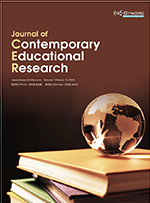Abstract
The effectiveness of Quizlet, an online vocabulary learning tool, in enhancing vocabulary acquisition and academic performance among Business English major students in China was investigated in this study. With emphasis on the importance of vocabulary proficiency for English learners, especially those in English-related majors, this research aimed to understand the impact of Quizlet on vocabulary mastery and its connection to overall academic success. A one-academic-year longitudinal experiment was carried out involving two classes, utilizing quantitative methods for assessing vocabulary retention and academic progress. Improvement was seen in the final exam rankings and vocabulary retention rates in Quizlet-engaged classes. Hopefully, this study could provide valuable insights for educators, curriculum designers, and researchers, guiding the optimization of language acquisition strategies in the digital age.
References
Anjaniputra AG, Salsabila VA, 2018, The Merits of Quizlet for Vocabulary Learning at Tertiary Level. Indonesian EFL Journal, 4(2): 1. https://doi.org/10.25134/ieflj.v4i2.1370
Carter R, Mccarthy M, 1988, Vocabulary and Language Teaching, Routledge, London.
Plonsky L, 2009, Vocabulary Learning Strategies and Foreign Language Acquisition. Visnja Pavi?i? Taka?. Clevedon,UK: Multilingual Matters, 2008. Pp. vii + 197. Studies in Second Language Acquisition, 31(3): 518–519. https://doi.org/10.1017/s0272263109090494
Wang W, Motteram G, 2006, CALL in China. Iatefl Voices, 2006(190): 7–8.
Chen J, 2005, Computer-Assisted Teaching or Autonomous Teaching. Computer-Assisted Foreign Language Education, 104: 9–12 + 49.
Ma M, 2020, Computer-Assisted Language Learning in China: What Opportunities and Challenges Are We Facing? An Interview with Jianlin Chen. International Journal of Chinese Language Teaching, 1(2): 62–69. https://doi.org/10.46451//ijclt.2020.09.05
Lightbown PM, Spada, N, 2021, How Languages Are Learned (5th Edition), Oxford University Press, Oxford.
Schunk DH, Greene JA, (eds) 2018, Handbook of Self-Regulation of Learning and Performance (2nd Edition), Routledge, London.
Miller GA, 1956, The Magical Number Seven, Plus or Minus Two: Some Limits on Our Capacity for Processing Information. Psychological Review, 63(2): 81–97. https://doi.org/10.1037/h0043158
Rogers C, 1969, Freedom to Learn, Charles E. Merrill, Columbus.
